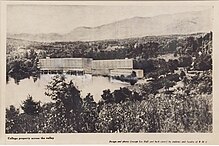Black Mountain College
Black Mountain College was a school near Asheville, North Carolina. It existed from 1933 to 1957.
 | |
| Type | Private liberal arts college |
|---|---|
| Active | 1933–1957 |
| Director | John Andrew Rice (until 1940) |
Administrative staff | about 30 |
| Students | about 1,200 total |
| Location | , , |
| Website | blackmountaincollege |
 | |
Black Mountain College Historic District | |
| Nearest city | Black Mountain, North Carolina |
| Area | 586.9 acres (237.5 ha) |
| Built | 1923 |
| Architectural style | Bungalow, craftsman, International Style |
| NRHP reference No. | 82001281[1] |
| Added to NRHP | October 5, 1982 |
The college was started by John Andrew Rice in 1933. He wanted to have a school that ran on philosopher John Dewey's ideas about education. One of the big ideas was that the study and practice of art was most important to a person's education.[2] Another idea was that students should be free to learn in their own way and in their own time.[3]
From the beginning, the school attracted faculty who were original thinkers and talented makers. These included John Andrew Rice (classical literature), Theodore Dreier (physics), Frederick Georgia (chemistry), and Josef and Anni Albers (art). Poet Charles Olson was an important teacher in the 1950s.[3]
Visiting faculty during the summer terms included dancer Merce Cunningham; composer John Cage; painters Jacob Lawrence, Robert Motherwell, Franz Kline, and Ben Shahn; photographers Harry Callahan and Aaron Siskind; critics Clement Greenberg, Paul Goodman and Alfred Kazin; architects Walter Gropius and Buckminster Fuller; poets Robert Creeley, Robert Duncan and Hilda Morley; and potters Marguerite Wildenhain and Shoji Hamada.[3]
Many students became very well-known in the 1950s and later. They included sculptor Ruth Asawa; artists Ray Johnson, Kenneth Noland, Robert Rauschenberg, Cy Twombly, and Robert De Niro Sr.; and filmmaker Arthur Penn, poet John Wieners, and writer Francine du Plessix Gray.[3]
The college closed after 24 years in 1957 because of money problems.[3]
References
change- ↑ "National Register Information System". National Register of Historic Places. National Park Service. 2010-07-09.
- ↑ "Black Mountain College: A Brief Introduction". Black Mountain College Museum + Arts Center. Retrieved 2023-02-22.
- ↑ 3.0 3.1 3.2 3.3 3.4 Fortini, Amanda (2022-07-07). "Why Are We Still Talking About Black Mountain College?". The New York Times. ISSN 0362-4331. Retrieved 2023-02-22.

